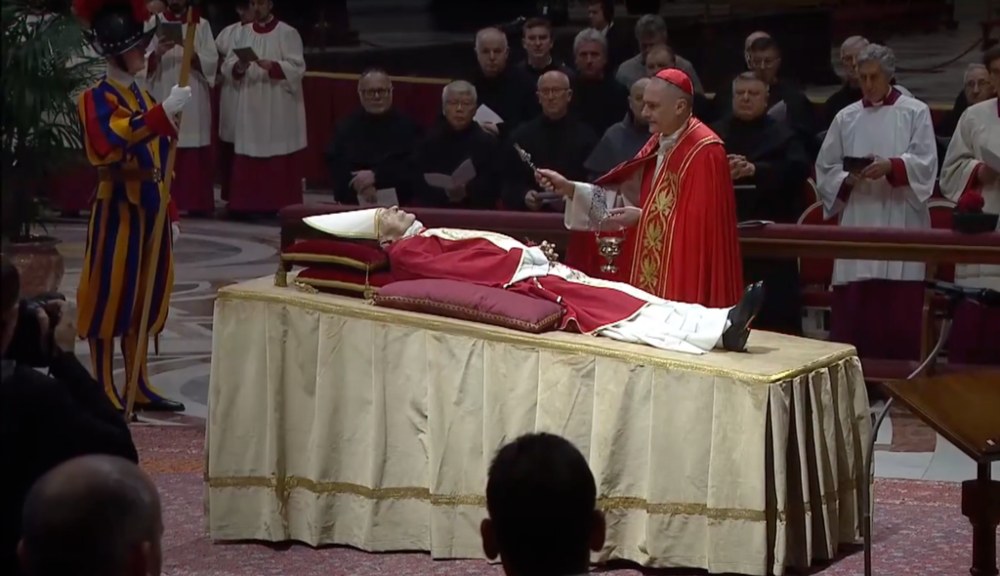Rome — Sacrosanctum Concilium, the Second Vatican Council’s Constitution on the Sacred Liturgy, mandated a revision of the Roman Rite that would be characterized by a “noble simplicity.” That concept was born from the classic Liturgical Movement, which had a powerful influence on the spirituality and theology of the young Joseph Ratzinger. I found it appropriate that the funeral Mass for the late Pope Emeritus was characterized by what seemed to me noble simplicity, albeit noble simplicity amplified by the participation of thousands of concelebrants.
That the liturgy was conducted primarily in Latin was also in accord with the teaching of Sacrosanctum Concilium, and in this instance at least the Latin served as a universal language for a Mass in which the entire world Church was represented. Thus the Latin response, Te rogamus audi nos, sung by the congregation, tied together the general intercessions prayed in German, French, Arabic, Portuguese, and Italian.
That the Mass also reflected in part the liturgical tradition in which Joseph Ratzinger, the future Pope Benedict XVI, had grown up was entirely appropriate and, for those aware of the symmetry, touching. The entrance antiphon, sung in Gregorian chant, was the ancient Requiem Aeternam. The Kyrie was a lovely sung dialogue between the congregation (chant) and the choir (SATB polyphony)—a modern adaptation that seemed concordant with the venerable text and its Gregorian expression.
The Gregorian Sanctus was a setting that Ratzinger would have sung as a boy, as was the Pater Noster and Agnus Dei. The Final Commendation and Farewell included the ancient chant In Paradisum and the Magnificat—and could anyone not be moved by that great Marian hymn of praise being sung as the casket of a man who strove to live his life proclaiming the greatness of the Lord was carried into St. Peter’s for his burial?
It also struck me that one of the unremarked accomplishments of Pope Benedict XVI seems to have been the reform of the Sistine Choir. Once known by local wags as the “Sistine Screamers” for their operatic caterwauling, the choir now sings in a far more restrained manner, with minimal warbling and far more clarity.
In the hours after the funeral Mass, criticism of the brevity of Pope Francis’s homily reverberated throughout the Twitterverse and Catholic blogosphere. I can’t agree. All papal events (liturgical and otherwise) must now be conducted in two hours or less, given the current pope’s poor health. Catholic funeral Masses are not supposed to include eulogies (a proscription often ignored in U.S. parishes). The logic of the proscription makes considerable theological sense. A eulogy, summarizing the past, is out of place in a Mass of Christian burial that is liturgically focused on the future, both the future of the soul and the eschatological future when Christ returns in glory and the dead in Christ are raised to a new and superabundant form of life, as previewed in the Lord’s Resurrection and Our Lady’s Assumption.
A skillful preacher can weave elements of a life into a proper funeral homily. (Fr. Raymond de Souza’s homily at the funeral Mass of Fr. Richard John Neuhaus was a masterpiece of this genre.) But Pope Francis is not the homiletic genius that his papal predecessor was, so I was not offended by the brevity of his remarks, which were thoroughly Biblical and Christocentric—quite appropriate for the funeral Mass of the Christ-centered Benedict XVI. Pope Francis’s extensive quotation from the Pastoral Rule of Pope St. Gregory the Great neatly linked Benedict XVI to his peer—perhaps his only peer—as a papal preacher. The last words of the homily—“Benedict, faithful friend of the Bridegroom, may your joy be perfect in hearing His voice definitively and forever!”—could not have been improved upon.
In sum: an appropriate liturgical farewell to a man of the liturgy, whatever expectations were frustrated.
George Weigel, who formerly lived in Seattle, is Distinguished Senior Fellow of Washington, D.C.’s Ethics and Public Policy Center, where he holds the William E. Simon Chair in Catholic Studies. This article first appeared in First Things.
Discover more from Post Alley
Subscribe to get the latest posts sent to your email.
